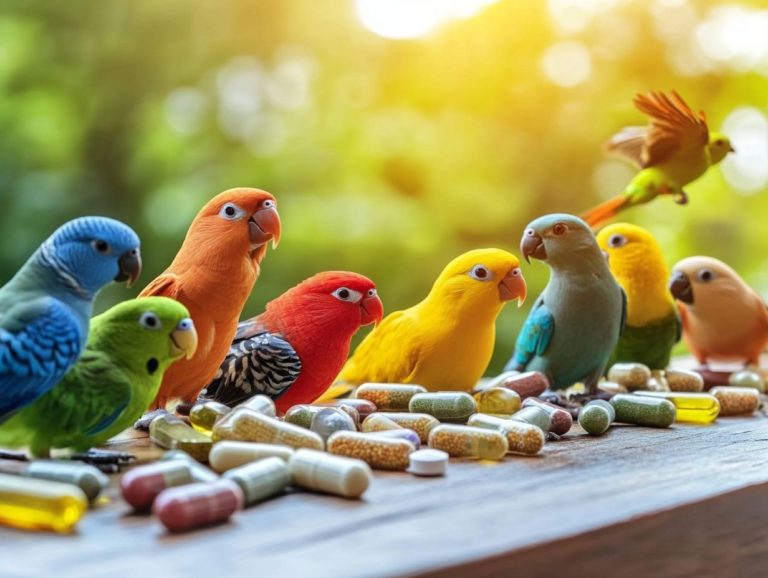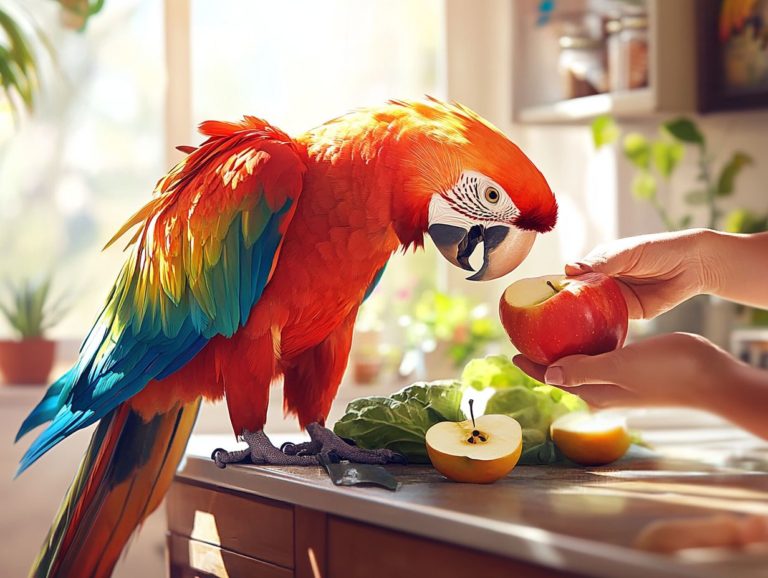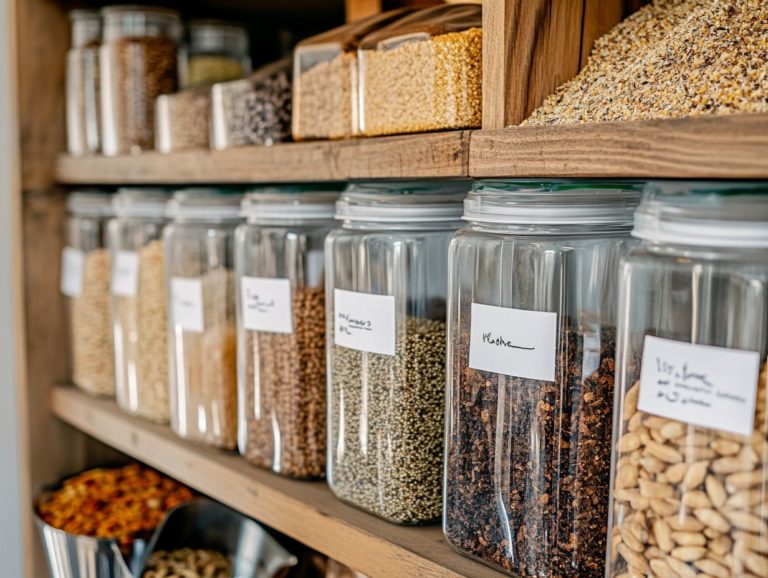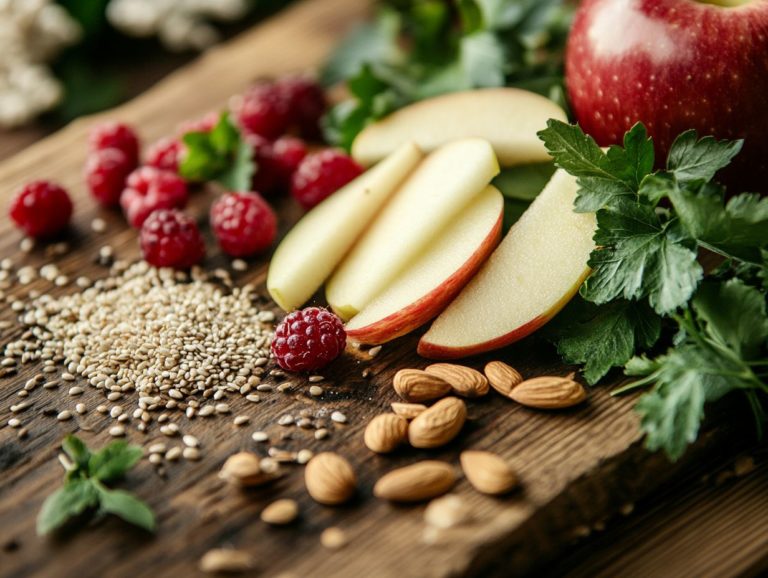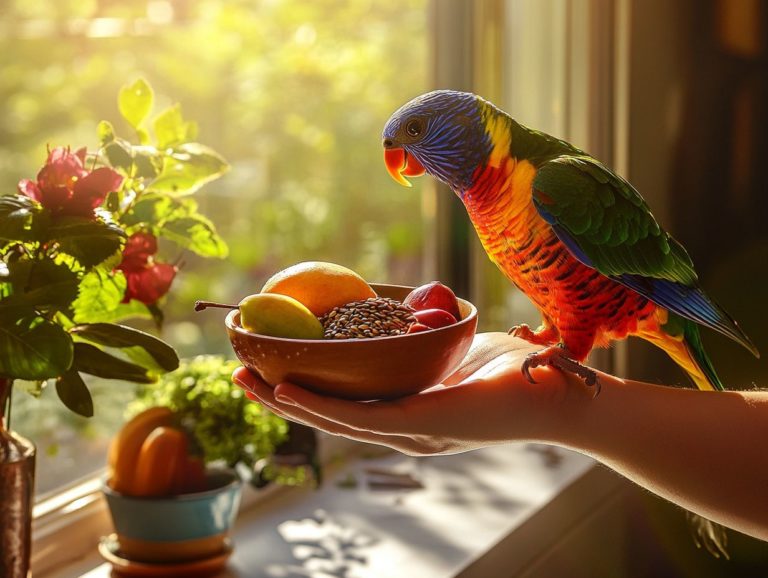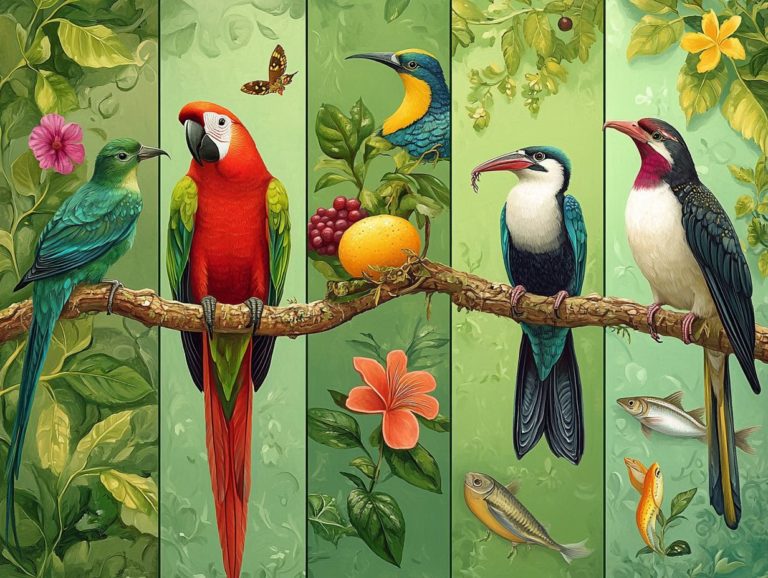How Often Should You Feed Your Bird?
Let s dive into the world of bird nutrition and uncover how you can keep your feathered friends healthy and happy! Proper nutrition is essential for the health and happiness of your feathered friends. Just like us, birds flourish on a balanced diet specifically tailored to their unique needs.
This article delves into the dietary requirements of various bird species and their different life stages. It also addresses the factors that determine how often they should be fed.
You’ll find general guidelines for optimal feeding practices. Moreover, it covers the signs of overfeeding or underfeeding and offers tips for hand-feeding. Dive in to ensure your bird receives the care it truly deserves!
Contents
Key Takeaways:

- Providing proper nutrition is essential for the health and well-being of birds, including pets and wildlife.
- Factors such as species, age, dietary restrictions, and health conditions can impact how often birds should be fed.
- It is important to follow general guidelines for daily amounts and timing of feedings. Be aware of signs of overfeeding or underfeeding.
The Importance of Proper Nutrition for Birds
Proper nutrition for birds, especially for beloved pet species like parrots, is vital for their overall health and longevity. It helps maintain an ideal weight and prevents obesity-related issues. For instance, Fatty Liver Disease is a condition where fat builds up in the liver, which can affect a bird’s health.
By ensuring a balanced diet that includes a variety of meals fresh fruits, vegetables, pellets, and seeds you can significantly enhance your bird s vitality. This blend is essential for social interaction, both of which are vital for their well-being.
Regularly consulting a bird veterinarian helps you make informed decisions about feeding schedules and dietary needs. This ensures your feathered friend thrives.
Understanding a Bird’s Dietary Needs
Understanding a bird’s dietary needs is crucial for ensuring optimal health and longevity, especially for pet species like parrots. They thrive on a balanced diet of fresh fruits, vegetables, pellets, and seeds. Each species has its own unique dietary requirements that must be met to prevent health issues such as obesity and nutritional deficiencies.
For example, while some species may flourish with leafy greens, others might require a higher protein content. Fresh fruits and vegetables are essential as they provide hydration and vital vitamins that boost the immune system.
Pellets can serve as a complete diet, ensuring that essential minerals are not overlooked. Seeds should be offered sparingly due to their high-fat content.
By grasping these dietary components, you foster better energy levels and overall well-being in your birds. This allows them to showcase their vibrant personalities and natural behaviors. Proper bird care revolves around these nutritional practices, ensuring not just survival but a flourishing and happy life for your feathered companions.
Factors That Affect Feeding Frequency
Several factors influence how often you should feed your birds, including their species, age, and health status. It’s essential to consider these elements, especially when managing obesity in certain cases. For guidance, check out this resource on how to create a feeding schedule for your bird.
Younger birds generally need more frequent meals to support their growth. In contrast, older or less active birds may thrive on a more controlled feeding schedule. This approach helps maintain a healthy weight and prevents excessive weight gain.
Species and Age of Bird
The species and age of a bird are crucial. They determine its dietary needs and feeding habits.
Each species has unique requirements that must be addressed to ensure optimal health and well-being.
For example, young parrots often demand more frequent feedings compared to adult birds, who thrive on a more regulated diet.
Similarly, the nutritional needs of finches can vary significantly based on activity levels.
Active finches may thrive on a diet rich in high-energy seeds, while less active peers might require a balanced blend to prevent obesity.
Older birds often face health issues that call for specialized diets, such as those low in fat or enhanced with specific vitamins and minerals to support their aging bodies.
Crafting a carefully curated feeding routine that takes these factors into account enhances overall health and contributes to longevity and energy.
Understanding the distinct dietary requirements across various species and life stages is essential for anyone dedicated to responsible bird care.
Dietary Restrictions and Health Conditions
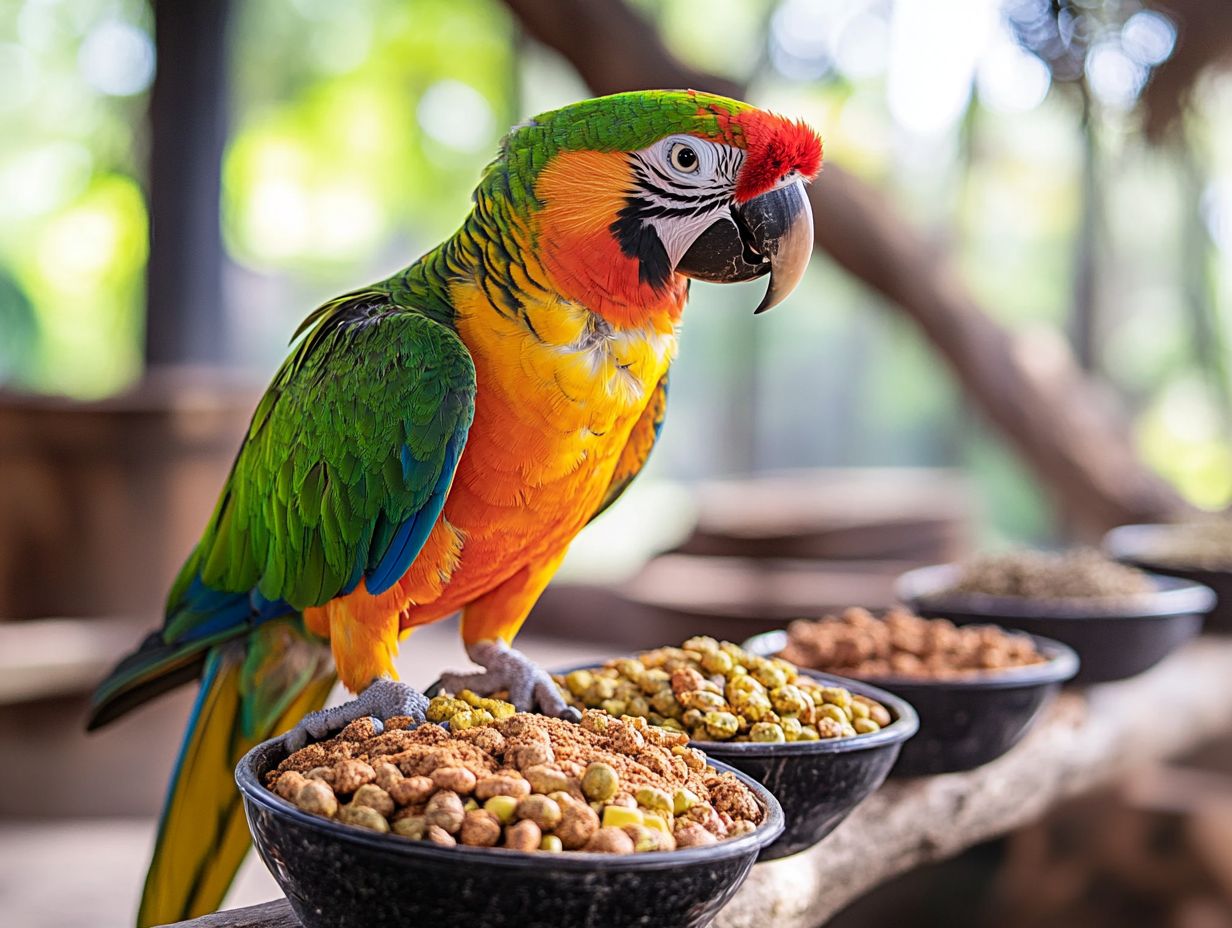
Dietary restrictions stemming from health conditions are critical considerations for you as a bird owner.
Managing issues like obesity or nutritional deficiencies is vital.
Regular consultations with a vet specialized in birds can help you tailor a diet that accommodates these restrictions while ensuring your bird receives essential nutrition.
For example, some birds may develop metabolic disorders, conditions affecting how the body processes food, that hinder their ability to metabolize fats and sugars.
It is imperative to adjust their diets accordingly.
Recognizing the signs of these conditions such as lethargy, feather plucking, or excessive weight gain is vital for timely intervention.
By collaborating closely with an avian vet, you can pinpoint your bird’s specific dietary needs.
Provide a well-rounded assortment of seeds, pellets, fruits, and vegetables that support overall health.
This partnership allows you to develop customized feeding plans that tackle immediate health concerns and promote long-term well-being and energy for your feathered friend.
General Guidelines for Feeding Birds
To ensure the well-being of your pet birds, it s essential to adhere to general feeding guidelines.
Understand recommended daily amounts as well as the timing and frequency of meals.
Establishing a consistent feeding schedule such as providing meals in the morning and evening can significantly contribute to your birds’ health.
This helps prevent dietary issues and makes it easier to manage their nutritional needs effectively.
Recommended Daily Amounts
Establishing the recommended daily food amounts for your birds is essential for their health and well-being.
It particularly helps in preventing issues like obesity that can arise from overfeeding.
The specific quantities depend on the bird’s species, age, and activity level, meaning you ll need to customize your feeding practices accordingly.
For example, larger species like cockatoos generally require about 1/2 to 1 cup of pellets or seeds each day, while smaller birds such as budgerigars may only need around 1/4 cup.
It’s also crucial to factor in your bird’s overall health and any medical conditions that might require adjustments to their diet.
To ensure you’re serving the right portions, consider using measuring cups or a digital kitchen scale.
Regularly monitoring your bird’s weight and behavior can help you spot signs of overfeeding or underfeeding.
Watch for lethargy or a dip in energy levels, which may signal that it’s time to tweak their diet for optimal health.
Timing and Frequency of Feedings
The timing and frequency of feedings are essential to your bird’s overall health, directly impacting its energy levels and daily behavior. By establishing a consistent feeding schedule, such as morning and evening meals, you can help regulate your bird’s metabolism while promoting a sense of stability in its routine.
Understanding the unique needs of different species is crucial. Some birds, like parrots, thrive on multiple smaller feedings throughout the day, while others may prefer a more structured approach. Variations in feeding schedules can significantly influence their mood and well-being. A finch may become stressed if meals are inconsistent, while a cockatoo might be more flexible.
Let s create a successful routine! Take the time to observe your avian companion’s behaviors and adjust feeding times accordingly. This ensures they receive the right nutrition when they need it most.
Signs of Overfeeding or Underfeeding
Recognizing the signs of overfeeding or underfeeding is crucial for ensuring your bird’s health. Both extremes can lead to significant issues like obesity or malnutrition. By regularly monitoring your bird’s weight and behavior, you gain valuable insights into its dietary needs, allowing you to make informed adjustments to its feeding routine.
This proactive approach promotes your bird’s well-being and enhances the bond you share.
How to Recognize and Address Issues
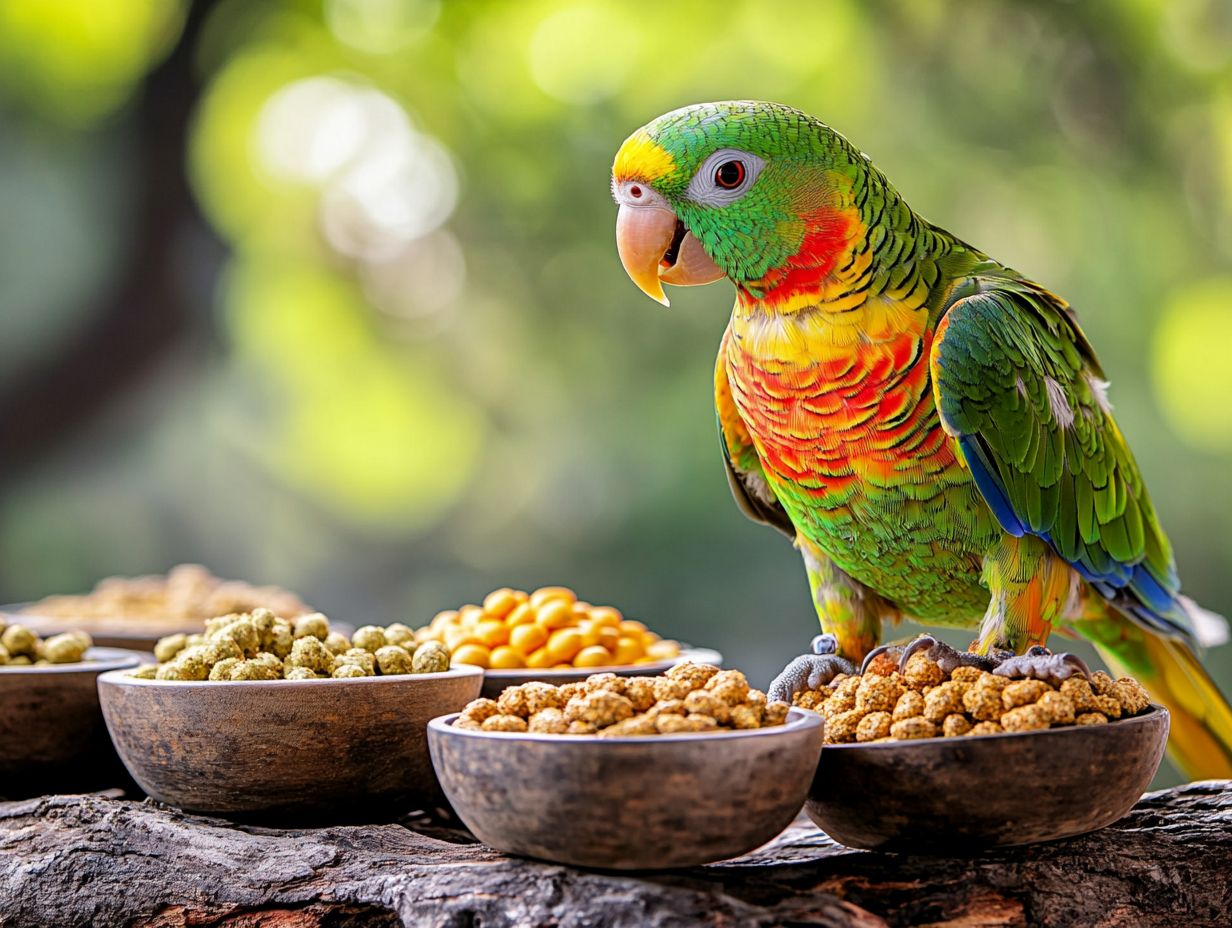
To effectively recognize and address feeding issues in your birds, closely observe any changes in their weight, behavior, and overall health, as these can indicate underlying dietary problems. By adopting a proactive approach to monitoring their feeding habits, you can ensure that any issues are identified early and addressed appropriately.
Keeping a daily log of food intake and behavioral patterns will help you spot any anomalies. Sudden weight loss or decreased activity can signal that the current diet isn’t meeting your bird s nutritional needs. To support your feathered companions, consider adjusting portion sizes or exploring different food formulations that promote optimal health.
In certain situations, consulting an avian veterinarian can provide tailored advice and recommendations for addressing specific dietary concerns. This ensures your birds enjoy a balanced and healthful diet.
Special Considerations for Hand-Feeding Birds
Hand-feeding birds requires a thoughtful approach to ensure their health and safety. Pay close attention to the techniques you use and determine the right frequency for feedings.
This method is especially helpful for young or ailing birds, as it enables you to closely monitor their intake and nutritional needs while nurturing social bonds.
Proper Technique and Frequency
Employing the right technique in hand-feeding is essential for your bird’s health and nutrition. This ensures it receives the appropriate amount of food at the right frequency. This approach supports healthy weight management and fosters trust and social interaction between you and your feathered friend, creating a safe environment.
To establish a successful hand-feeding routine, aim to offer small portions two to three times a day. Incorporate nutritious treats, tailoring your approach based on your bird’s individual needs and appetite. For optimal feeding times, refer to the best time to feed your pet bird. Monitoring your bird’s health is crucial; keep an eye on any changes in weight and behavior, as these can signal nutritional deficiencies or health issues, including Fatty Liver Disease, a serious condition that can affect your bird’s health.
It’s also wise to introduce a variety of nutritious foods, such as grains, fruits, and vegetables, including fresh options, to promote a balanced diet. Creating a calm environment during feeding time can further enhance positive interactions, allowing your bird to feel safe and comfortable while you strengthen that special bond through training and foraging.
Frequently Asked Questions
How Often Should You Feed Your Bird?
This will depend on the type of bird and its age. However, a general rule is to offer food twice a day, monitoring the schedule to ensure they receive a consistent diet while being mindful of how to avoid overfeeding your bird.
Remember to closely monitor your birds and consult a veterinarian for advice whenever needed!
Can I Leave Food Out For My Bird All Day?
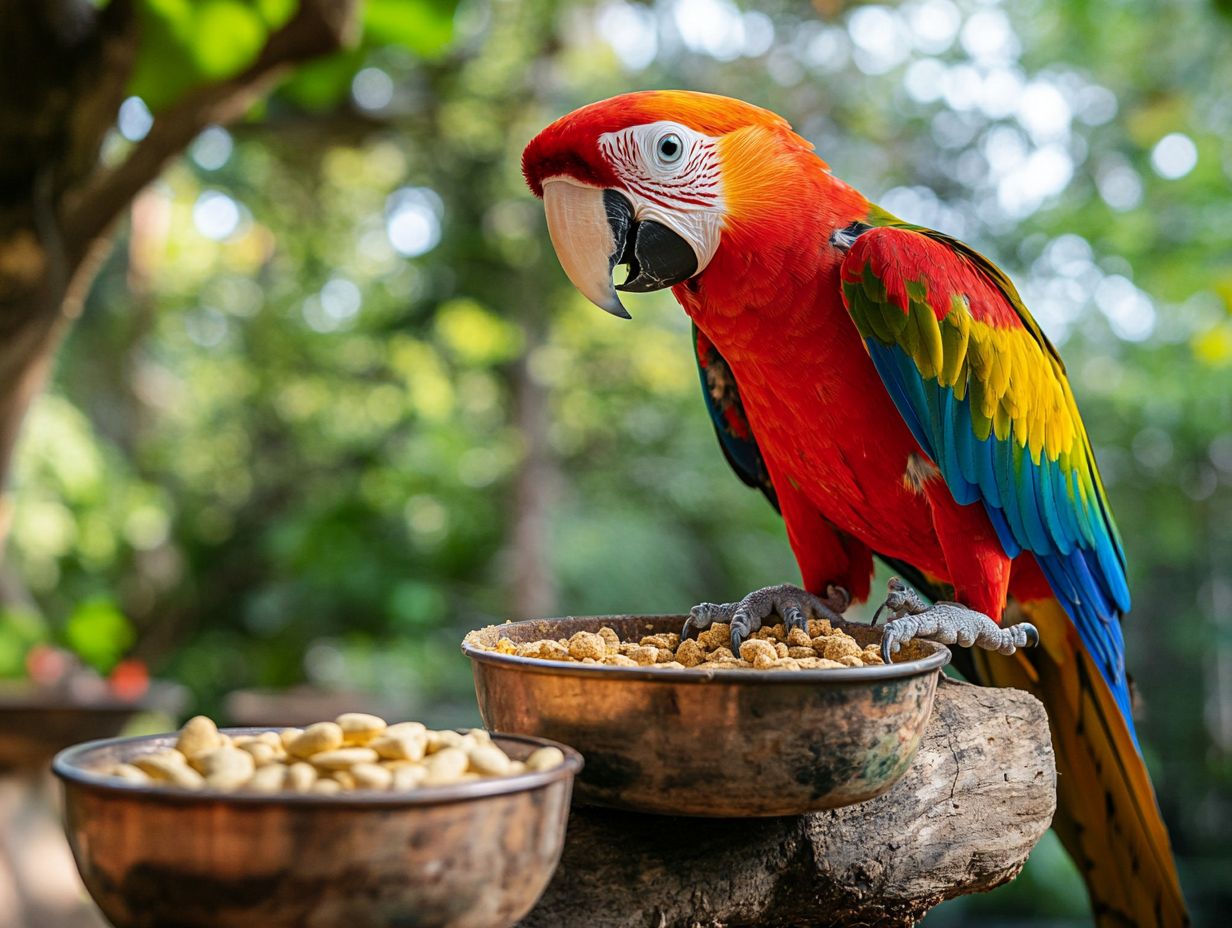
No, it is not recommended to leave food out all day. This can lead to overeating and obesity.
Offer food at specific times. Remove any uneaten portions after 30 minutes to prevent unhealthy habits.
Should I Give My Bird Snacks Throughout the Day?
Snacks should be given sparingly and should not be the main part of what your bird eats.
Stick to healthy options such as fresh fruits and vegetables as treats. This encourages your bird to explore its diet.
Do I Need to Adjust the Feeding Schedule for Baby Birds?
Baby birds need to be fed more often, usually every 2-3 hours, until they are weaned and can eat on their own.
Follow a feeding schedule that keeps them healthy.
What Happens if I Forget to Feed My Bird?
Skipping a meal now and then is okay, but try not to make it a regular thing. Consistency is key for your bird’s health and well-being.
This is especially crucial for maintaining a healthy weight.
How Do I Know if I’m Feeding My Bird Enough?
Keep an eye on how your bird looks and feels. If they are gaining weight, you may need to adjust the amount of food given.
Don’t wait! If you’re worried about your bird’s health or diet, call your vet today!

